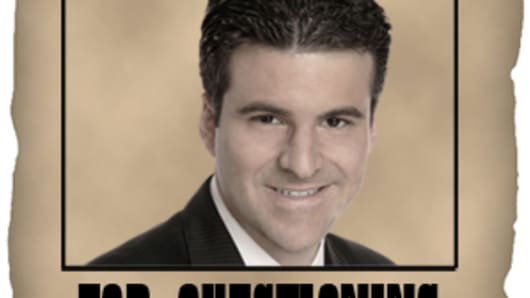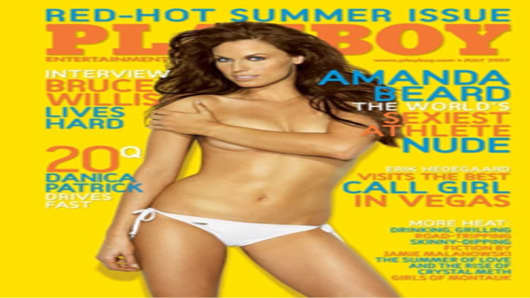Well folks, I’ve never thought I’d utter this phrase: I am a murder suspect. But, truth be told, I apparently am. This according to World Wrestling Entertainment , who gave me this statement when I called them yesterday to answer whether they were irresponsible in issuing a news release that “Mr. McMahon” was “presumed dead” after his limo was blown up last Monday.
Here’s what they sent me:
To date, World Wrestling Entertainment, Inc. has not received a single inquiry from a shareholder regarding the alleged demise of “Mr. McMahon.”
It is well known to our shareholders and our viewers that “Mr. McMahon” is a character portrayed by Vincent Kennedy McMahon, the founder and Chairman of World Wrestling Entertainment, Inc.
As far as speculation as to who may have committed this heinous act against “Mr. McMahon,” the WWE has not ruled out any suspects, including CNBC sports business reporter Darren Rovell. The WWE would like to thank CNBC for its concern over the “Mr. McMahon” mystery and we would like to remind your viewers to continue to tune into WWE’s Monday Night RAW, cable’s top rated program on USA Network (a division of NBCU), to keep abreast of the latest developments in this ongoing situation.
Now let’s go through this thing. As you can see, WWE is clearly differentiating between Vince McMahon, the chairman and the character. I’m not a hard core wrestling fan, but do all the shareholders and fans really know the difference between the two? I would bet not.
For help on whether the WWE would be exposed to a shareholder lawsuit, I turned to Michael McCann of the Mississippi College of Law and the great Sports Law Blog and Ira Lee Sorkin, who is a former SEC regional director.
Q: Was the WWE irresponsible in the way they communicated that “Mr. McMahon was presumed dead?
McCann: The basic rules that are at play here related to rule 10B5 of the Securities Exchange Act. It’s a rule that regulates the nature of information disclosed by a company and that regulates whether or not information provided to shareholders is conveyed in a way that’s honest, truthful and valid. Whether or not that rule is violated in this case would depend on the intent of the WWE and even if there wasn’t intent whether or not the behavior was reckless. Certainly the WWE has to be responsible in any communication it makes to the general public and particularly one that may affect the decision-making of its shareholders. And when the company makes a statement that is untrue, even one that’s a joke, it can affect the behavior of its shareholders in ways that may be disadvantageous to those shareholders and potentially in a way that could violate the law.
Sorkin: You have to ask yourself when does entertainment end and when does full and fair disclosure begin? At what point is it no longer entertainment? People invest their money in companies some companies make movies, some companies make jet engines, some companies are in the entertainment business. And Vince McMahon and the WWE have said for years since I guess the congressional hearings that they’re in the entertainment business. This is not a sport. It’s entertainment. Nevertheless, the loss of the driving force behind the company is not something to be laughed at or to be looked at lightly. It would have an impact.
Q: The fact that the WWE is the WWE -- does that buy them any leniency?
Sorkin: The SEC doesn’t look at the company and say, “This is entertainment and this company makes jet engines.” They’ve got an obligation under the securities laws to make accurate and fair and full disclosure of all material events. And if Vince McMahon is and has been for as long as I can remember the key to the WWE -- and before that the WWF -- then the loss of the chairman CEO and founder, someone who is the driving force behind the company, is certainly a material event which would have an impact on the shareholders.
McCann: Wrestling may be fake, but business and dealings are not fake. And investors are certainly not fake and money is certainly not fake. And while the product can be artificial and one that’s based on entertainment when people are dealing with their investments, they usually want certainty. They usually want some type of protection that the information that they are receiving from the company is valid and honest.
Q: The stock is only down 3.3 percent since “Mr. McMahon” was presumed dead. If Vince McMahon passed away, the stock likely would have been down double digits. What’s the chance that someone got confused and could allege that they suffered actual damages from trading on the information that they thought Vince McMahon, the person, was dead?
McCann: It’s a difficult claim. That even though we can look at the WWE and argue that there behavior wasn’t up to snuff in terms of what we would expect a company to do in this post-Enron, post Martha Stewart era, it’s still a hard claim to make because either intent needs to be shown or a lower threshold of recklessness that’s acknowledged in many courts.
Q: The WWE could say that a shareholder could have easily gone on the Internet and confirmed that Vince McMahon was still Chairman, that there wasn’t an 8-K filed. What’s wrong with that?
Sorkin: It’s not the responsibility of a shareholder to do research to determine whether there’s accuracy in reporting events of this magnitude. The burden is on the company in this instance to make the appropriate disclosure. Now you can make the argument that the WWE is more than entertainment, it’s a farce. It’s a comic book. But nevertheless, it’s a comic book that is required to abide by the federal securities laws to make the appropriate disclosure and where do you draw the line between saying the shareholders should know that this is just one big laugh, it’s one big joke - we’ve been like this for years - if a shareholder has invested their own money? It’s no joke to lose money.




